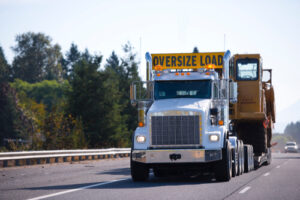
Rhode Island Trucking Laws & Regulations
 Commercial trucking companies and truck drivers must follow numerous laws and regulations intended to protect everyone on the road. When they fail to do so, innocent people can get hurt – or worse. An accident caused by a violation of trucking laws typically means that truck drivers and trucking companies can be held liable for the injuries, property damage, and financial losses they have caused others.
Commercial trucking companies and truck drivers must follow numerous laws and regulations intended to protect everyone on the road. When they fail to do so, innocent people can get hurt – or worse. An accident caused by a violation of trucking laws typically means that truck drivers and trucking companies can be held liable for the injuries, property damage, and financial losses they have caused others.
At Bottaro Injury Lawyers, our top-rated personal injury attorneys represent the rights and interests of truck accident victims throughout Rhode Island and Southeastern Massachusetts. Our clients and peers have recognized us for our firm’s track record of success, which includes securing millions in compensation for our clients.
When you have been hurt through no fault of your own, you need experienced legal representation to help you make a full recovery – and you shouldn’t have to pay out of pocket to pursue it. With our firm’s No Fee Guarantee, you can turn to us for help without paying any upfront costs. You’ll only pay us when we win a financial recovery for you.
If you have questions about Rhode Island trucking laws and how they may apply to your case, turn to Bottaro Injury Lawyers for a free initial consultation and find out why “It’s Good to Know Mike.”
Rhode Island Commercial Truck Driver License Requirements
To operate a commercial vehicle in Rhode Island, drivers must have a valid commercial driver’s license (CDL). To apply for a CDL in Rhode Island, the applicant must:
- Be least 18 years old to operate commercial trucks solely within Rhode Island, or at least 21 years to drive trucks on an interstate basis or to carry hazardous materials.
- Must have held a valid regular driver’s license for at least two years with no suspensions or revocations.
- Must be a U.S. citizen or lawful permanent resident and a resident of Rhode Island.
- Must pass a medical exam completed by a medical examiner certified by the Federal Motor Carrier Safety Administration.
- If applying for a Class A or B CDL for the first time (not transferring an out-of-state CDL), applicants must pass an FMCSA certified entry-level driver training program.
CDLs come in three classes, which authorize a driver to operate commercial trucks up to a specific size:
- Class A – Allows for the operation of any combination of vehicles with a gross combination weight rating (GCWR) of more than 26,000 pounds and a gross vehicle weight rating (GVWR) of more than 10,000 for towed vehicles.
- Class B – Allows for the operation of single or combination vehicles with a GVWR of more than 26,000 pounds for the single vehicle, where a vehicle being pulled does not exceed 10,000 pounds.
- Class C – Allows for the operation of commercial trucks not described in Class A or B, including those used in the transportation of hazardous materials.
In addition to the class of CDL, drivers may obtain endorsements to their license that permit them to operate certain types of vehicles or to carry certain kinds of cargo. Common endorsements include:
- T – Double or triple trailers
- N – Tank vehicles
- H – Hazardous materials
- X – Hazardous materials carried in tank vehicles
Rhode Island Truck Speed Limits
Commercial trucks are limited to a maximum speed of 65 miles per hour on interstates and freeways in Rhode Island. However, when interstates and freeways pass through an urban area, traffic must observe lower speed limits of 50 to 55 mph.
On other divided highways, trucks must observe the maximum speed limit of 55 mph. Undivided highways have a 50 mph limit.
Rhode Island Truck Weight Limits
Under Rhode Island state law, trucks may operate only if they meet the maximum weight limits prescribed by law. These limits include:
- Axle load limit – The weight on any one axle of a commercial truck cannot exceed 22,400 pounds.
- Two-axle vehicles – Maximum weight (including load) of 32,000 pounds with less than six feet between the axles, or 36,000 pounds with less than 12 feet between axles.
- Three-plus axle single vehicles – Maximum weight (including load) of 40,000 pounds with 12 feet or less between the front and rear axles, or 44,000 pounds with less than 20 feet between the front and rear axles.
- Three-plus axle tractor or semi-trailers – Maximum weight (including load) of 46,000 pounds with less than 22 feet between the front and rear axles of the combined unit, or 50,000 pounds with less than 27 feet between the front and rear axles.
- Tandem axle vehicles – No more than 80,000 pounds.
Vehicles that exceed weight limits must be specially permitted by the Rhode Island Department of Transportation.
Rhode Island Trucking Regulations for Hours-of-Service Limits
Under federal law, truck drivers are limited in the number of hours they may spend on duty or behind the wheel. These regulations are called the hours-of-service limits. Hours-of-service rules for truck drivers in Rhode Island state that they:
- May not drive longer than 11 total hours after spending at least 10 consecutive hours off duty.
- May not drive beyond the 14th consecutive hour after coming on duty, following an off-duty period of at least 10 straight hours.
- May extend the 11- and 14-hour rules by up to two hours if they encounter adverse driving conditions.
- Must take a break of at least 30 minutes after driving for eight consecutive hours.
- May not drive after spending at least 60 hours on duty in any seven-day period or at least 70 hours on duty in an eight-day period. The seven or eight-day periods reset after a driver spends at least 34 consecutive hours off duty.
- May split their 10-hour off-duty period, so long as one period is at least two hours long (whether spent inside or outside the sleeper berth) and the other involves at least seven consecutive hours spent in the sleeper berth. All sleeper berth time must add up to at least 10 hours.
Truck drivers are exempted from the hours-of-service limits if they drive within a 150-air-mile radius of their normal work reporting location. Their duty shift does not exceed 14 hours, and the driver returns to their work reporting location at the end of the shift.
Rhode Island Oversized Load Regulations
For a commercial truck to carry an oversized load in Rhode Island, the operator must apply for and receive an oversized load permit from the Rhode Island Department of Transportation. Other regulations concerning oversized loads stipulate that:
- Trucks must display red or orange fluorescent flags of at least 18 square inches. Overwidth loads must display at least two and up to six flags at the widest extremities of the load, while overlength loads or loads with excessive front or rear overhands must display one flag at the end of an overhang of fewer than two feet wide, or two flags for overhangs over two feet wide.
- Trucks must also display a sign bearing the words “OVERSIZED LOAD.” Signs must be no less than seven feet long and 18 inches tall, with letters not less than 10 inches high with 1.4-inch brush strokes. Signs must be posted at the front and rear of the truck. Escort vehicles must also display smaller-sized signs.
- Trucks must also always have low beam headlights active while carrying an oversized load.
- Oversized loads may be required to be accompanied by escort vehicles with flashing yellow lights at the highest point of the escort vehicle and with low-beam headlights always active. Escort vehicles must have two-way radio contact with the truck at all times.
- Oversized loads traveling on the same road in the same direction must maintain at least 1,000 feet of distance between each other.
- Oversized loads may only travel between 30 minutes prior to sunrise to 30 minutes after sunset on Monday through Friday, except state and federal holidays, unless travel on Saturday or Sunday is authorized by a permit.
- Oversized loads may not travel in inclement road, weather, or visibility conditions.
- Trucks with oversized loads must always travel in the right lane on a multi-lane road.
Dangers of Breaking Rhode Island Trucking Laws
Truck drivers and trucking companies that break state and federal trucking laws put everyone on the road at risk of injury. The size and weight of commercial trucks mean they cannot slow down, speed up, or maneuver as quickly as smaller passenger vehicles.
Trucking laws have been designed to ensure that commercial trucks can safely share the road with other motorists. When truck drivers and trucking companies ignore or violate these laws and regulations, they create the ideal conditions for an accident that can seriously injure others on the road.


